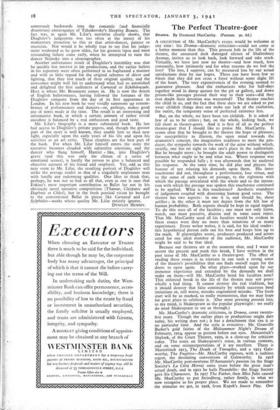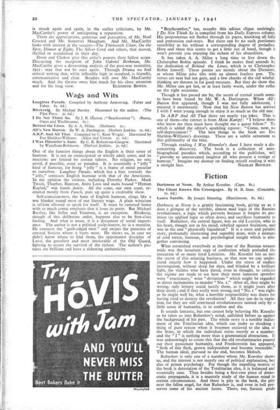The Perfect Theatre-goer
Drama. By Desmond MacCarthy. (Putnam. 9s. 6d.) A COLLECTION of Mr. MacCarthy's essays would be welcome at any time : his Drama—dramatic criticisms—could not come at a better moment than this. This present halt in the life of the theatre, the unnatural dark damaged silence of Shaftesbury Avenue, invites us to look back, look forward and take stock. Virtually, we have just now no theatre—and how much, how constantly, how intimately and for what reasons do we feel the loss? The loss, I suppose, can In measured less by our actual satisfactions than by our hopes. There can have been few so biases that they did not cross a foyer without some slight lift of the heart. The very expensiveness of the evening seemed to guarantee pleasure. And the enthusiasts who for half-days together stood in damp queues for the pit or gallery, and down prison-like passages pressed their way to their seats—did they ever doubt their devotion was warranted? The theatre touches the child in us, and the fact that these days we are asked to put away childish things does not make our lack of the exaltation, the outlet, the temporary sense of perfected existence less.
But, on the whole, we have been too childish. It is asked of few of us to be critics ; but, on the whole, looking back, we fell short as theatre-goers. And it is first of all as the perfect theatre-goer that I should like to praise Mr. MacCarthy. It seems clear that he brought to the theatre the hope of pleasure, the susceptibility to illusion, the open mind towards the dramatist's concept, the imaginative readiness to meet the pro- ducer, the sympathy towards the work of the actor without which, strictly, one has no right to take one's place in the auditorium. But he brought more ; he brought the adult power to distinguish between what ought to be and what was. Where response was possible he responded fully ; it was afterwards that he analysed his response. At the same time, he did play and players the honour of not relaxing his demands upon them. His inner touchstone did not, throughout a performance, lose virtue, and to the sense of each scene or passage, to the rightness with which the passage articulated with the whole and to the intona- tion with which the passage was spoken this touchstone continued to be applied. What is this touchstone? Aesthetic soundness of judgement coupled with discerning human good sense. The theatre has two aspects : in one it is, and should be, sheer artifice ; in the other it must not depart from the felt law of human probability. Both aspects should be kept in equal regard. To do this uses all of the faculties ; one must not only listen, watch, one must perceive, discern and in some cases reject. That Mr. MacCarthy used all his faculties would be evident in these essays were they no more than notations of so many experiences. Every writer writes, it is said, for his ideal reader: this hypothetical person calls out his best and keeps him up to the mark. If playwrights wrote, producers produced and actors acted for one ideal Member of the audience, Mr. MacCarthy might be said to be that ideal.
Because our theatres are at the moment shut, and I want to accent the present and mark this break, I have written in the past tense of Mr. MacCarthy as a theatre-goer. The effect of reading these essays is to recreate in one such a strong sense of the theatre's possibilities that one finds oneself eager for the doors to open again. On what plays—worked upon by our immense experience and extended by the demands we shall make on them—will Mr. MacCarthy bend his faculties next? This enforced break in the life of the theatre may not prove wholly a bad thing. It cannot destroy the real tradition, but it should destroy that false continuity by which successes bred imitations or, still worse, mistake engendered mistake. The fresh start will be so marked, so really momentous, that we may hope for great plays to celebrate it. (Our most pressing present loss, to my mind, is Shakespeare as the popular playwright : we really do need Shakespeare to see us through.) Mr. MacCarthy's dramatic criticisms, in Drama, cover twenty- five years. Though the earlier plays or productions might date today, his writing does not ; it has a detachment that ties it to no particular time. And the style is evocative: Mr. Granville Barker's gold fairies of the Midsummer Night's Dream of February, 1914, appear as present before our eyes. Moscovitch's Shylock, of the Court Theatre, 1920, is a close-up for criticism today. The notes on Shakespeare's sense, in various contexts, and on some misinterpretations of it are excellent. There is Maeterlinck 1913, The Death of Tintagiles, and a 1913 Gals- worthy, The Fugitive—Mr. MacCarthy exposes, with a -ruthless regret, the desolating conventions of Galsworthy. In 1918 Mr. MacCarthy post-mortems D'Annunzio's passion (in the Stage Society's La Citta Marta) some years before the great man's actual death, and in 1922 he hails Pirandello: the Stage Society gave Six Characters. In 1927 The Father, then Miss 7ulie caused Mr. MacCarthy to put Strindberg, rather firmly, in what we now recognise as his proper place. We are made to remember the stimulus we got, in 1928, from Kapek's Insect Play. One
is struck again and again, in the earlier criticisms, by Mr. MacCarthy's power of anticipating a reputation.
There are appreciations, generous and perceptive, of Mr. Noel Coward and Mr. Somerset Maugham. And Mr. MacCarthy looks with interest at the success—The Thirteenth Chair, On the Spot, Dinner at Eight, The Silver Cord and others, that moved, thrilled or scandalised in their day.
Ibsen and Chekov give this critic's powers their fullest scope. Discussing the reception of John Gabriel Borkman, Mr. MacCarthy gives a devastating analysis of the post-war mentality, 1921 : may that not be ours again. Through Drama we find critical writing that, while inflexibly high in standard, is friendly, communicative and clear. Readers will owe Mr. MacCarthy much. And the theatre owes him much for his close attention































 Previous page
Previous page